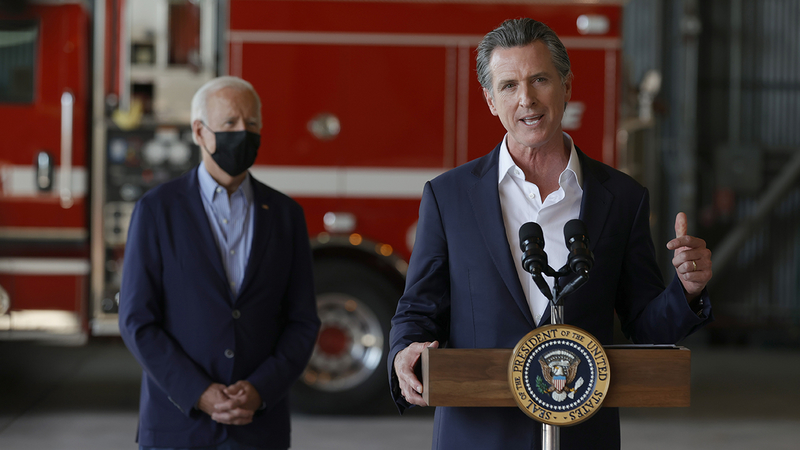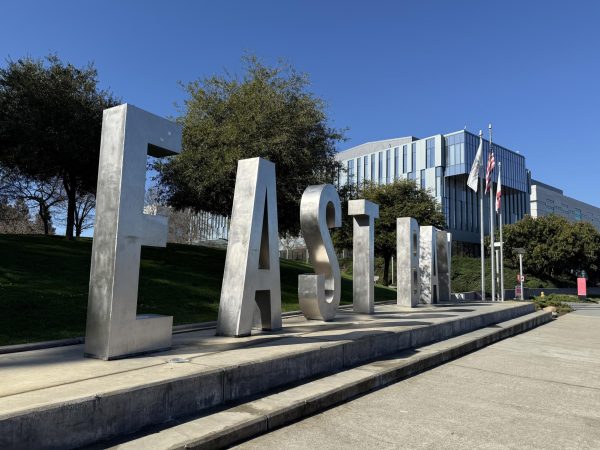“Who Refuses a Cup of Sugar?” Partisan Fault Lines Within California Politics
Businesses are leaving California at an alarming rate, for which many are quick to blame Newsom’s administration. What consensus exists between lesser candidates in addressing this issue?
With the recall election on Sept. 14, Governor Gavin Newsom is now the projected winner with 57.3% in favor of his retention, FiveThirtyEight reported. While voter turnout will ultimately determine the outcome of the recall, the battle for governorship remains squarely between Newsom and Elder.
It is important to remind ourselves that Elder and Newsom are not the only ones running. The recall election has attracted several “political neophytes,” encompassing teachers, business owners, and average Californians alike of varying political orientations. Some view the upset as an opportunity to oust Newsom, while others perceive their candidacy as an alternative to Newsom if he is unseated.
“I am running as a safety net, [since] I thought Democrats should have a Democrat to choose from,” physician and attorney Dr. Brandon Ross said. “If you vote no on the recall, leave the second part blank, and the recall is successful, you didn’t have a choice in who got placed.”
As Democrats mobilize to resist the recall, candidates from both sides of the political aisle have expressed frustration with the policy performance of the incumbent, including the imposition of regulations onto fledgling small businesses.
Democrat Jacqueline McGowan, a “disaffected Newsom voter,” described Newsom’s policy as “idealistic, but not implementable.” As a marijuana consultant, a “pro-business Democrat,” and a Wall Street veteran of 18 years, McGowan calls for the deregulation of small businesses, referring to small businesses as “little embers that just need a little stoking.”
McGowan plans to consider cryptocurrencies as viable exchange mediums and speculative devices, deregulate the cannabis industry, and champion the legalization of psychedelics and sex work within the state to spur emerging markets. “Everyone needs to stop acting like they know what’s best for someone to do with themselves, [so] let’s go explore these markets and get our economy back roaring,” McGowan said in an interview.
John Drake, a 20-year-old college student, believes that overregulation is an issue of inequality towards small businesses, rather than an absolute burden. Drake’s platform includes the dismantling of excessive bureaucracy within government institutions and leveling the playing field for small, medium, and big businesses. “We treat small businesses more fairly than big businesses,” according to Drake. “[I intend on] holding big businesses accountable and making them pay their fair share.”
Excessive regulation and “cutting the red tape” continues to be a theme in the candidacy of Dr. Brandon Ross. Ross suggests eliminating income taxes for salaries $150,000 or less and raising the marginal income tax rate for salaries over $2 million to 20%. “[We] can’t lower the taxes on businesses, [we] need that money to do the things that we want to do. But, [we] can get rid of a lot of regulations that stifle businesses.” Instead of taxing enterprises, Ross proposes addressing the income tax rate to make the state more affordable to live and work in: “Freeing up that money for the middle class would allow them to survive on lower salaries, which would help businesses.”
Holly Baade, a yoga instructor, coincides with Drake on increasing taxes for “corporate titans,” who, in her view, are profiting to the detriment of Californians. “We have places that are so valuable that we can name the price and I think that we should,” said Baade, “not just for businesses that incorporate here, but also for businesses that want access to the people of California.”
Across the aisle, Doug Ose, former U.S. Representative, advocates for reducing the regulatory burden and ensuring widespread adoption of California-adjacent environmental protection policy to secure the viability of the local markets. “Businesses want certainty. When the rules are so variable, then businesses make the logical decision to move to a more favorable climate. Quit making my tax rate three times that of Lincoln, Nebraska,” said Ose. SOURCE.
Social worker and Oxnard pastor Sam Gallucci identifies as a “conservative with centrist interests,” voicing his support of removing tax burdens on small businesses. “The Democratic Party has violated core California values of ‘work and let work,’” claims Gallucci. “[The Democratic Party] wants you to work the way [they] tell you to work.”
Gallucci’s primary goal is to “awaken the sleeping giant” that is the Hispanic voter block, whom he believes naturally aligns with conservatism. “Hispanics don’t want money, they want the California dream.”
Jenny Rae Le Roux, former Bain consultant and business owner, attributed the exodus to overregulation, high fees, and high taxes. “I have talked to businesses who left the state, they say regulation is the issue,” says Le Roux. To loosen regulations, Le Roux proposes lowering the LLC filing fee to match the national medium and instituting COVID-related liability protection for businesses as part of an endeavor to prevent abuse by private attorneys.
Beyond the two-party paradigm is Michael Loebs, a Political Science professor at San Francisco State University and Chair of the California National Party, who advocates for greater local political empowerment. Loebs suggested reopening the Pacific Stock Exchange as a method of bolstering California’s local economy: “We have plenty of industries that could be listed on a California Stock Exchange, or we could do investment within California for Californians. One thing about bringing California businesses back is having the trappings of an economic powerhouse.”
Loebs proposed assisting small businesses by replacing the welfare system with Universal Basic Income, introducing negative income tax, and implementing automatic enrollment into MediCal. “[My policy] would remove the burden of providing healthcare for small businesses, encourage shorter hours, and [allow for] more part-time jobs,” says Loebs, “You are always better off working when you can, but you aren’t stuck into the system of competing for full-time jobs.”
However diverse these stances might be, all of these candidates pursued bipartisanship as a goal of their candidacy as a result of political resentment. “People are sick of politics, but are hungry for government,” Le Roux explained. In the eyes of these hopefuls, their candidacy represents the electorate’s yearning for consensus without party politics. McGowan put it best: “When a neighbor asks for a cup of sugar, do you say no based on partisan lines?”







